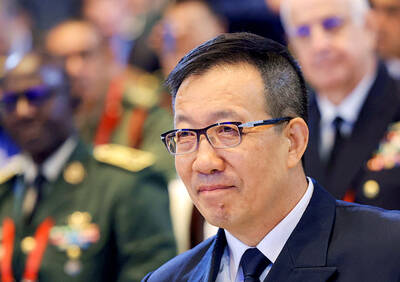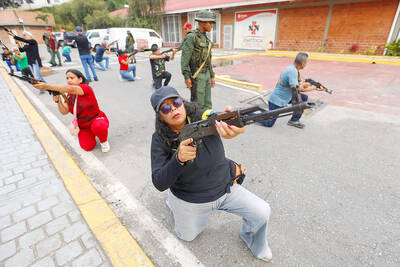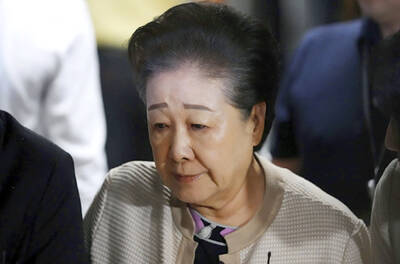Poor villagers and wild elephants are engaged in an increasingly bitter battle for space and food in Zambia, with animal conservation authorities accused of doing little to end the conflict.
The elephants have claimed lives and destroyed property and vast fields of maize and cassava in the landlocked country.
Terrorized people say Zambia's estimated 25,000 elephants have pushed the hungry and helpless deeper into poverty.
Clashes with elephants increase during the farming season when huge migrating herds from neighboring Zimbabwe, Mozambique and Botswana and local elephants move in search of greener pastures and water.
Mounting reports of destruction wrought by the elephants when huge herds leave their designated game area and invade farmers' fields, destroying crops and property, have been coming from the north, south and east in recent months.
About 10 people have also been reported killed in elephant attacks on villages.
The Mpika district in northern Zambia reported on Tuesday that elephants had destroyed maize and cassava fields.
"Elephants have left the park and are destroying our crops and plunging us into further poverty," said Emelda Mulenga, a villager hit by the havoc.
Local chiefs in affected areas say the elephants have become a menace and were aggravating the situation because they destroyed people's homes and food.
The farming season has reached a critical stage and most of the affected areas have yet to recover from last season's drought.
Many communities still have no food. The Zambian Wildlife Authority (ZAWA) says it cannot compensate people whose crops and property have been destroyed by the elephants because it has no provision.
The elephants must be protected for their economic value and their importance for tourism in the southern African state, says ZAWA spokesperson Maureen Mwape.
"We want the elephant because of the value it brings the country. Communities just have to learn to live in harmony with the elephants," she says.
"It's difficult to separate the two and the solution is not in killing the animals," Mwape explains.
However, this approach has brought ZAWA to near-violent conflict with local communities for failure to investigate their plight.
Mwape says that the authority is not happy that people's crops have been destroyed and wants local communities to be pro-active and participate in conserving the animals.
"We don't enjoy seeing people going hungry, but we have a job to protect the elephants, hippos and all wild animals. The goal is in conservation," she says.
Insufficient funding and low manpower has left ZAWA less than capable of responding to calls to clear the animals.
The slaying of elephants in Zambia is illegal and carries stiff penalties and minimum prison sentences of between seven and 10 years.
Mwape explains that high levels of human population growth in affected areas is a critical contributing factor to the conflict between the poor and the elephants.
"People in search of more land have moved and settled in the range and routes of the animals. This has depleted the animal's space," she explains.
Elephant attacks have also been attributed to drought and joint borders with national parks and game management areas in neighboring countries, which force the increased density of elephants to migrate.
"In the process, they eat people's crops in settlements," Mwape points out.
Last May, the government introduced elephant sport hunting to contain the animal numbers and curb the destruction of crops and human life.
However, this has yet to show any significant effect or benefit the local communities.

BEIJING FORUM: ‘So-called freedom of navigation advocated by certain countries outside the region challenges the norms of international relations,’ the minister said Chinese Minister of National Defense Dong Jun (董軍) yesterday denounced “hegemonic logic and acts of bullying” during remarks at a Beijing forum that were full of thinly veiled references to the US. Organizers said that about 1,800 representatives from 100 countries, including political, military and academic leaders, were in Beijing for the Xiangshan Forum. The three-day event comes as China presents itself as a mediator of fraught global issues including the wars in Ukraine and Gaza. Addressing attendees at the opening ceremony, Dong warned of “new threats and challenges” now facing world peace. “While the themes of the times — peace and development —

Venezuela on Saturday organized a day of military training for civilians in response to the US deployment in the Caribbean, and amid new threats from US President Donald Trump. About a month ago, Washington deployed warships to international waters off Venezuela’s coast, backed by F-35 jets sent to Puerto Rico in what it calls an anti-drug and anti-terrorism operation. Venezuelan Minister of Defense Vladimir Padrino Lopez has accused Washington of waging “undeclared war” in the Caribbean, after US strikes killed over a dozen alleged drug traffickers off his country’s coast. Caracas also accused the US of seeking regime change, and

BRIBERY ALLEGATIONS: A prosecutor said they considered the risk of Hak-ja Han tampering with evidence to be very high, which led them to seek the warrant South Korean prosecutors yesterday requested an arrest warrant for the leader of the Unification Church, Hak-ja Han, on allegations of bribery linked to the country’s former first lady and incitement to destroy evidence. The move came a day after the 82-year-old was questioned over her alleged role in bribing former first lady Kim Keon-hee and a lawmaker. Founded in 1954 by her late husband, Sun Myung Moon, the Unification Church has long been the subject of controversy and criticism, with its teachings centered on Moon’s role as the “second coming” and its mass weddings. Followers are derisively referred to as “Moonies.” However, the church’s

‘MURDER’: The US has not provided proof that boats it has struck were trafficking drugs, and a Venezuelan official said it was a crime against humanity that must be investigated Venezuela on Friday accused the US of waging an “undeclared war” in the Caribbean and called for a UN probe of US strikes that have killed more than a dozen alleged drug traffickers on boats over the past few weeks. Washington has deployed warships to international waters off Venezuela’s coast, backed by F-35s sent to Puerto Rico in what it calls an anti-drug operation. “It is an undeclared war, and you can already see how people, whether or not they are drug traffickers, have been executed in the Caribbean Sea. Executed without the right to a defense,” Venezuelan Minister of Defense Vladimir